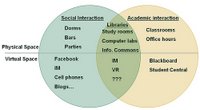"I’ve been playing around with making a worksheet to use when I’m working with students who are just starting a research project. “Research” in this context refers to library research to find relevant articles, books, documents, etc, about a topic.
So here’s my first draft:
What discipline or disciplines am I working in?
What type of literature or information do I need?
How and where will I search for the information I need?
How will I access the information that I find?
What keywords or terms will I use to describe my topic?
After running a few searches: What results am I getting?
What refinements should I make to my search in light of those results?
How will I use the results that I’ve found?
What am I missing?







